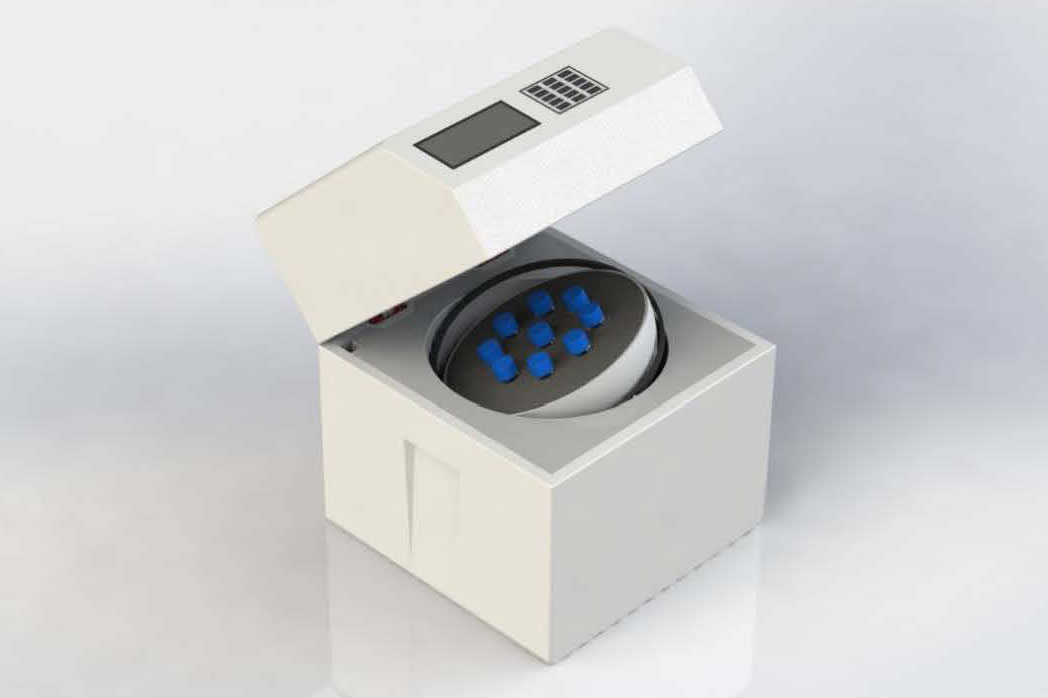
A Florida Polytechnic University capstone design team is working to create a thermoregulatory transport device for biological samples. The device (rendering pictured) will hold biological samples at a steady temperature for up to a week, improving the testing process for viruses such as COVID-19.
Testing of biological samples for COVID-19 and other medical purposes relies upon the samples being held at the right temperature until the test can be completed. Maintaining this stable environment can mean the difference between a successful test and a ruined sample.
“I realized there’s a gap in industry when you’re sent an at-home stool analysis, for example, which we provide for our customers,” said Lauren Wright, CEO of the Natural Nipple Corp., based in Tampa, Florida. “It just comes from competitors in a FedEx mailer and you swab your baby’s poop, then put it back in the package to send to a lab, which can take over a week to ship. By this time, without the ability to be frozen, it isn’t even valid results you’re getting.”
Wright and her company sponsor a capstone design project that challenges students to create a thermoregulatory transport device for biologics. The device would allow medical samples to be held at a chilled, stable temperature for several days to allow ample time for transportation to appropriate facilities.
A team of four mechanical engineering seniors and three computer engineering seniors is working to make the idea a reality. The group is designing and building a sturdy device to keep biological samples at the right temperature for a week. The triple-insulated device will include a powerful battery and a heatsink, which will help keep it cool.
“The stuff inside those vials is very temperature-sensitive and the protein denatures as the temperature changes,” said Krystal Rivera, who leads the mechanical engineering team. “We are making a cooler and in the middle there is a gyroscope, so whenever the cooler is moved, the vial stays upright.”
While the device is being designed for a company that would use it for transporting materials such as breastmilk and fecal samples, it also can be used to safely transport samples to be tested for COVID-19 to sometimes distant laboratories.
“With so many COVID-19 samples going through, the supply chains are backed up and the time to transport takes longer than normal,” said Kara Baldwin, a mechanical engineering student from Cary, North Carolina. “While in transit, the samples can be exposed to high or low temperatures that can affect how quickly the proteins denature.”
The challenges posed by COVID-19 extend beyond the performance of the device. The team currently is collaborating remotely to remain in compliance with best practices to prevent the spread of the virus.
For Baldwin, the chance to work on the project aligned perfectly with her personal interests. Before joining Florida Poly, she was a nursing student and worked as a certified nursing assistant in a hospital.
“One of the reasons I was interested in nursing was because I really liked working with the equipment and it’s cool that I’m able to do that application in real life now through this project,” Baldwin said. “Hopefully after graduation I end up somewhere developing medical devices at an affordable rate so they can be used by everyone from different socioeconomic backgrounds.”
The team hopes to have a prototype of the thermoregulatory transport device for biologics ready by the end of the spring semester.
Contact:
Lydia Guzman
Director of Communications
863-874-8557